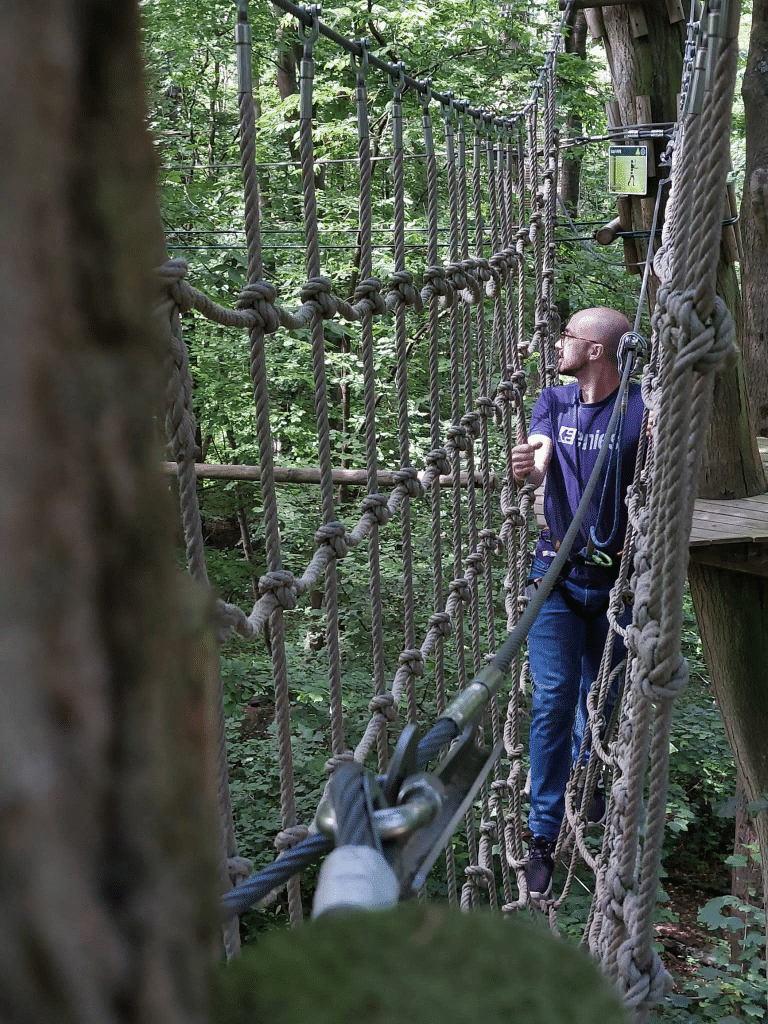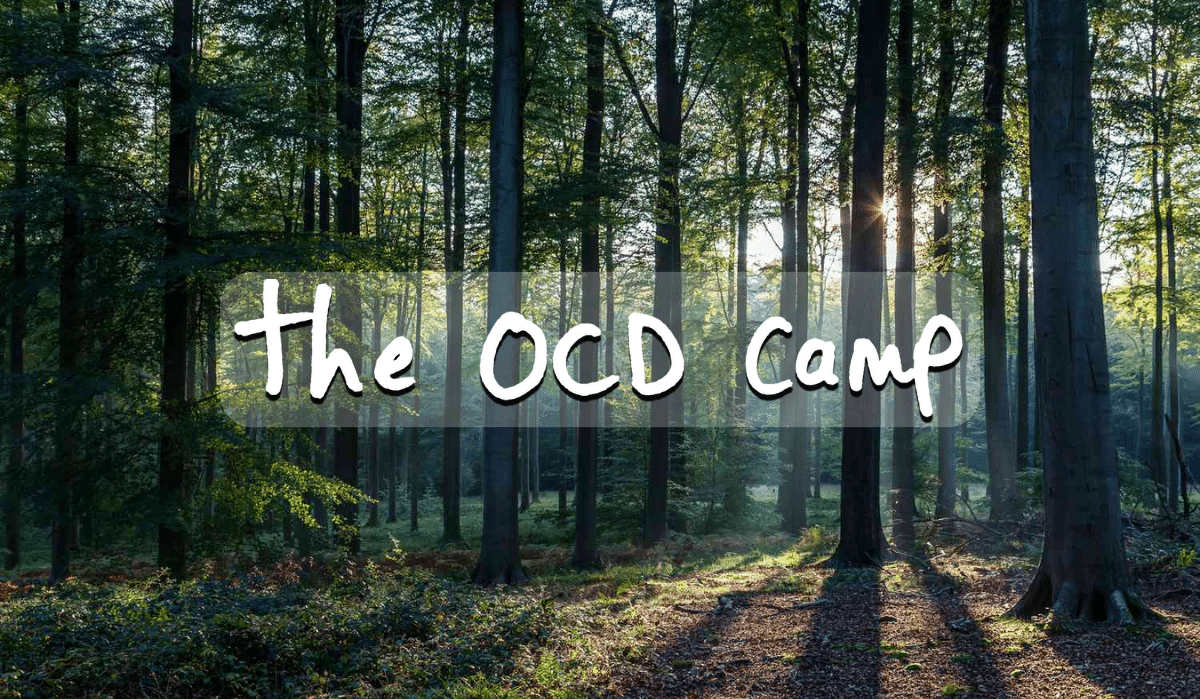In January 2024, we had the pleasure of speaking with Stuart Ralph, the driving force behind The OCD Stories podcast. Cara, our Communications Manager, spoke with Stuart about the origins of his podcast, the reasons behind launching the UK’s first OCD Camp, and the roles that community and nature can play in OCD recovery.
Thank you for joining us, Stuart. Your podcast, The OCD Stories, has seen tremendous success, with over 400 episodes and 6 million listeners globally. What inspired you to start it?
The OCD Stories began as a collection of written stories, inspired by my own comfort in reading others’ experiences with OCD. At the time, I noticed there wasn’t a single place where all these personal stories were gathered together, so I wanted to create one. The podcast, launched in December 2015, initially featured experts providing advice and through time it grew to include lived experience stories as well. I think its growth and resonance stem from its varied content and openness to discussing different aspects of OCD and therapy.
More recently, you founded the first OCD camp in the UK in 2018. It would be great to hear about the camp and what led you to establish it.
The camp’s inspiration came from my 2016 interview with Pete Weiss on the podcast. Pete is a therapist who featured in the BBC’s Extreme OCD Camp documentary, which I loved, so I knew I wanted to get him on the podcast quite early on. In the episode, he very generously offered to help me set up a similar camp in the UK and a couple of years later he did just that – the first camp was launched in 2018 and Pete flew over and helped me to run it. Over the years I’ve slowly adapted his model a bit to fit my style, but it still remains quite true to his. For anyone who has watched the documentary, the main difference is that our camp is a lot less focussed on ERP than the camp in the documentary. The UK camp does include some elements of ERP but it’s more about community connection, support and spending time in nature. It’s not therapy or a replacement for therapy. Saying that, the environment of the camp can provide natural exposure experiences. Activities like cooking and sharing spaces can naturally bring about exposure to common OCD fears, like contamination or harm, in a really supportive setting.
I can imagine that such an immersive environment might naturally present challenges. And life itself can often feel like a series of exposures!
Exactly. Even opening up and sharing stories, which is a big part of the camp, can be an exposure in and of itself. But it’s a really lovely, supportive environment to do it in.
Community building seems integral at the camp. How do you foster this?
Community is at the heart of the camp experience and we foster it from the moment the campers arrive. We begin by setting up and creating a set of shared values for the weekend and then lead into activities likesetting up tents, playing games and practising survival skills. Everything is designed to build connections and a sense of belonging from the very beginning, because we know joining the camp and being thrown into this quite intense situation with strangers can be an anxiety-provoking experience for anyone. The two evening activities are the things I usually keep more private because I like them to be a surprise for the campers, so I won’t go into too much detail, but the evenings are reserved for deeper sharing and connection and a big part of that is sharing our stories. We encourage everyone to take the time they need to share without any interruptions. It’s an opportunity for people to be heard. Maybe they’ve never been heard in that way before. It’s also a chance for the campers to be in a space with people who ‘get it’ – they don’t need to caveat every intrusive thought with “of course I won’t act on this thing I’m afraid of” or explain why they do their compulsions, because the others just understand. I think there’s something really healing about that, really cathartic. It’s lovely how quickly the campers form strong bonds, transforming from strangers to a supportive community within 48 hours. So far, every group has stayed in contact and there’s one group that has even met up and gone away for weekends since their time at the camp, so that’s really awesome.
The Camp seems to emphasise a connection with nature. What are the benefits of this?
The OCD Camp springs from a belief that nature and meeting others with OCD can be a valuable part of recovery and mental well-being. My training in Shinrin Yoku – which is Japanese for forest bathing – has taught me the profound effects of being in natural settings. When I’m out in nature I always find that I get really pulled into the here and now, not thinking about anything else. It’s quite incredible. And if you look at our role in nature as humans, it’s only the last few hundred years that we’ve really been indoors in a constant way. Thousands of years ago and a hundred thousand years before that, we were all outside in huts in forests. We would have been surrounded by trees more than we currently are. It’s arguably in our DNA. It’s what we’ve evolved to be used to and need. And now we’re in cities and away from it. So I think it’s about reconnecting with that and it’s about being in the here and now. The tranquillity and grounding effect of nature, including elements like birdsong and the campfire, are an important aspect of the camp.

It sounds like the OCD Camp adopts a holistic approach to OCD recovery.
Yes, you’re right, that’s what the camp’s about, and the podcast actually. It’s about asking: what does the person need? Yes, ERP is a big part of what they need. Is that enough? Maybe, but maybe not for everyone. As a therapist myself, what I don’t forget is that it’s two humans in a room. And it’s one human hopefully giving a lot of empathy, care and compassion to another who is struggling. That can be extremely healing. As a therapist, you can do ERP, but if you’re cold and mean, your client isn’t going to like you and probably isn’t going to get better. It’s that human connection that is really important and often overlooked, and it is that connection that the camp is focused on.
Lastly, for those interested, how can they apply for the camp?
The camp is open to UK residents over 18. The application process involves a simple form available on our website, followed by a follow-up call. We also have a FAQ section to help applicants understand the camp’s ethos and what to expect.
We charge a fee for attending the camp, but this is strictly to cover our costs. Our goal is to keep the price as accessible as possible for everyone.
Applications for this year’s camp close in just a few days on Thursday 25th January. You can find out more and apply here.

